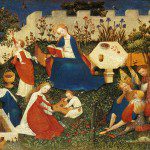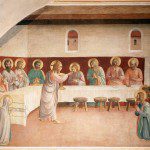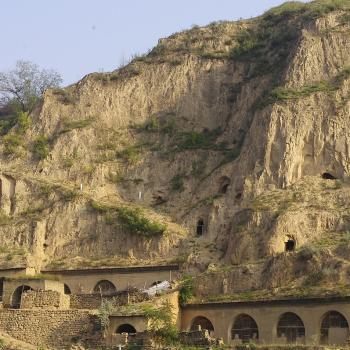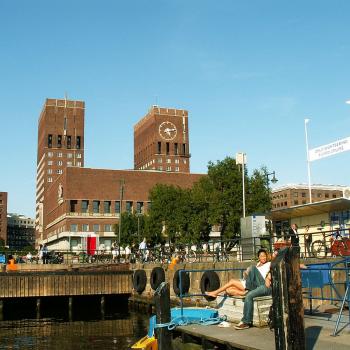To get into what they found as the content of Marx’s analysis would seem almost impossible in a blog post. I can only hope to give a basic sketch. Please keep that in mind; Capital is over 1000 pages long, and there is much else out there by Marx that his Catholic epigones have found of value. Let’s start with the commodity. Why? Marx does!
The wealth of those societies in which the capitalist mode of production prevails, presents itself as “an immense accumulation of commodities,” its unit being a single commodity. Our investigation must therefore begin with the analysis of a commodity. A commodity is, in the first place, an object outside us, a thing that by its properties satisfies human wants of some sort or another. The nature of such wants, whether, for instance, they spring from the stomach or from fancy, makes no difference. Neither are we here concerned to know how the object satisfies these wants, whether directly as means of subsistence, or indirectly as means of production.
To unravel the entirety of Marx’s conception of the commodity here would be impossible, but a few things may be said: note how he quickly makes his aim known. He is writing to understand as analytically as possible. But note also that he zeros in on the “commodity,” an issue of immense importance to the Catholic interested in dealing with, say, commercialism. What he promises is to help the reader see that commodities have not always been the dominant mode of exchange. And this is integral. Many Catholics seem to recognize that markets did not always function as they do now: barter once existed and would seem to operate on a different principle than contemporary capitalist exchange. What about the fact that most people were once subsistence farmers and now must pay for their food and clothing, a concept foreign to the medieval peasant? By beginning with the commodity, Marx promises a deeper understanding of the issue, one that will not end with lament, but that will make possible further action—an actual improvement in people’s lives.
Marx also has a certain moral streak. I have written about this before, in fact. Here are but a few examples of his decrying everything from child labor, to women working outside the home, to mothers drugging their children, to the moral qualities of those raised in such conditions:
Time for education, for intellectual development, for the fulfillment of social functions, for social intercourse, for the free play of the vital forces of his body and his mind, even the rest time of Sunday…what foolishness [from the perspective of the capitalist]. But in its blind and measureless drive, its insatiable appetite for surplus labour [the extra work Capital makes workers do for its profit as opposed to for their ability to buy life’s necessities], capital oversteps not only the moral but even the physical limits of the working day. It usurps the time for growth, development and healthy maintenance of the body. It steals the time required for the consumption of fresh air and sunlight. It haggles over the meal-times, where possible incorporating them into the production process itself, so that food is added to the boiler, and grease and oil to the machinery. It reduces the sound sleep needed for the restoration, renewal, and refreshment of the vital forces to the exact amount of torpor essential to the revival of an absolutely exhausted organism…Capital asks no questions about the length of life of labour-power [workers]. What interests it is purely and simply the maximum of labour-power that can be set in motion in a working day, It attains this objective by shortening the life of labour-power, in the same way as a greedy farmer snatches more produce from the soil by robbing it of its fertility.
Of the witnesses examined by Commissioner White (1863), 270 [of those working there] were under 18, fifty under 10, ten only 8, and five only 6 years old. With a working day ranging from 12 to 14 or 15 hours, night-labour, irregular meal-times, and meals mostly taken in the workrooms themselves, pestilent with phosphorous, Dante would have found the worst horrors in his Inferno surpassed in this industry…J Leach’s deposition: “Last winter six out of nineteen girls were away from ill-health at one time from over-work. I have to bawl at them to keep them awake.” W. Duffy: “I have seen when the children could none of them keep their eyes open for the work; indeed, none of us could…G. Apsden: “That boy of mine…when he was 7 years old I used to carry him on my back to and fro through the snow, and he used to have 16 hours a day…I have often knelt down to feed him as he stood by the machine, for he could not leave it or stop it.”
As was shown by an official medical inquiry in the year 1861, the high death-rates are, apart from local causes, principally due to the employment of the mothers away from their homes, and to the neglect and maltreatment arising from their absence, which consists in such things as insufficient nourishment, unsuitable food and dosing with opiates; besides this, there arises an unnatural estrangement between mother and child, and as a consequence intentional starving and poisoning of the children. In those agricultural districts “where a minimum in the employment of women exists, the death-rate is on the other hand very low.”
[Here he is quoting a commission’s report] A frightful source of demoralization is the mode of living…Whether members of his family or not, the men, boys and girls all sleep in the cottage, which contains generally two, exceptionally three rooms, all on the ground floor, and badly ventilated. These people are so exhausted after the day’s hard work, that neither the rules of health, of cleanliness, nor of decency are in the least observed. Many of these cottages are models of untidiness, dirt, and dust…The greatest evil of the system that employs young girls on this sort of work, consists in this, that, as a rule, it chains them fast from childhood for the whole of their after-life to the most abandoned rabble. They become tough, foulmouthed boys, before Nature has taught them that they are women. Clothed in a few dirty rags, the legs naked far above the knees, hair and face besmeared with dirt, they learn to treat all feelings of decency and shame with contempt.”…That excessive drunkenness is prevalent from childhood upwards among the whole of this class is only natural.
On a final note, Marx’s anthropology is not so different from that of Catholics. It is true that he was not a theist, but in analytic terms, he sees human people as free agents whose decisions are conditioned by their social surroundings. To be honest, that’s an idea found in Plato and Aristotle. What Marx adds is a rigorous framework for understanding current conditions, helping Catholic thinkers approach the problem of governance all the more powerfully.
I wish I could say more; I wish I could elucidate precisely what it is that Marx believed about, say, commodities, or value, or the particulars of how capitalism functions. I’d love to, but this blog post is already nearly 3000 words long. Besides, my goal has been more limited: to explain why it is that Marx was read by so many Catholics (and perhaps to exhort a few of you who might otherwise find him so offensive) to pick his works up, to put behind you some of your aversion and fear and meet the man on his own terms, as so many others. In this, I can only hope I have succeeded.













